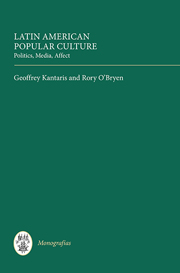Book contents
- Frontmatter
- Contents
- List of Illustrations
- Notes on Contributors
- Acknowledgements
- Introduction: The Fragile Contemporaneity of the Popular
- I Politics
- II Media
- 5 Narratives of Identity and Media Genres
- 6 Filming favelas: Space, Gender and Everyday Life in Cidade de Deus and Antônia
- 7 Colouring Pollution: ‘Cleaning’ the City and ‘Recycling’ Social Values in São Paulo Street Art
- 8 Blogging from the Margins: Grassroots Activism and Mass Media Forms in the Hiperbarrio Project
- III Affect
- Index
8 - Blogging from the Margins: Grassroots Activism and Mass Media Forms in the Hiperbarrio Project
from II - Media
Published online by Cambridge University Press: 05 October 2013
- Frontmatter
- Contents
- List of Illustrations
- Notes on Contributors
- Acknowledgements
- Introduction: The Fragile Contemporaneity of the Popular
- I Politics
- II Media
- 5 Narratives of Identity and Media Genres
- 6 Filming favelas: Space, Gender and Everyday Life in Cidade de Deus and Antônia
- 7 Colouring Pollution: ‘Cleaning’ the City and ‘Recycling’ Social Values in São Paulo Street Art
- 8 Blogging from the Margins: Grassroots Activism and Mass Media Forms in the Hiperbarrio Project
- III Affect
- Index
Summary
In recent years there has been a veritable explosion in Internet use in Latin America; according to recent statistics, in South America alone there are over 143 million Internet users, or 36.5 per cent of the population, representing an increase of over 900 per cent between 2000 and 2009.1 Alongside this growth in Internet use there has been a concomitant growth in literary, socio-cultural and artistic works which make use of the new medium, including blogs, hypertext novels, hypermedia fiction, net.art, online performance art, hacktivism and tactical media, among many others. From the first forays of the Zapatistas into the uses of new media technologies for oppositional purposes, giving rise to the term ‘digital Zapatismo’ (Domínguez c.1998), to the complex negotiations of on- and offline activism of the self-styled Chicano ‘cyberpunk media artist’ Fran Ilich, through to the multiple uses of digital technologies in by the now large and growing community of net.artists in Latin America, new media technologies in Latin America have been put to use in innovative and challenging ways by local practitioners, and frequently involve a consideration for the socio-political consequences of such technologies and their potentially resistant reworking.
While the wide range of tactical media projects, net.art, game art, hacktivism and other genres within Latin American digital culture cannot be subsumed into one universal model, one striking feature that is common to many of them is the way in which they involve a critical engagement with the on/offline interface, and the resistant reuse of (globalized) digital technologies, two notions which will be explored in more depth below.
- Type
- Chapter
- Information
- Latin American Popular CulturePolitics, Media, Affect, pp. 207 - 224Publisher: Boydell & BrewerPrint publication year: 2013



